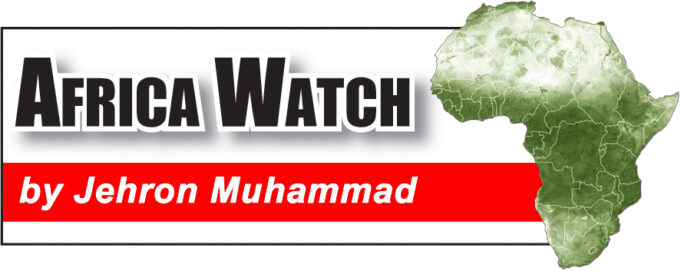Foreign Policy, a weekly digest of national security, defense, and cybersecurity news, recently reported that Africa is under pressure from European diplomats, to not allow Russia to use them to “evade U.S. and European sanctions.” One should ask, what one had to do with the other?
According to Bloomberg, on the day of Russia’s invasion of Ukraine, that the foreign ministry of the Motherland’s most influential nation-state South Africa, urged Russia to immediately withdraw its forces and respect Ukraine’s territorial integrity. The next day South Africa’s President Cyril Ramaphosa reconsidered and said U.S. President Joe Biden’s best option should have been meeting with Russian President Vladimir Putin and calling for dialogue to try and avert war.
“The war could have been avoided if NATO had heeded the warnings from amongst its leaders and officials over the years that its eastward expansion will lead to greater, not less instability in the region, not less,” Ramaphosa said in response to a question asked in South Africa’s parliament.
However, praise was heaped on Kenya’s UN Ambassador Marti Kimani’s earlier this year in his Security Council speech when he stated, “We must complete our recovery from the embers of dead empires in a way that does not plunge us back into new forms of domination and oppression.” He warned Russia to respect its border with Ukraine, using Africa’s colonial past to highlight the dangers of stoking the “embers of dead empires,” noted npr.com.
Kimani’s comments led many to assume, in face of invasion of Ukraine, Africa would stand by the West, against Russia. According to Justicesecurity.org, Africa’s response was “not only moral convictions alone.” The site reported that “many African countries receive substantial assistance from the United States and Europe, while others rely on both Ukrainian and Russian wheat and other agricultural commodities exports, which are disrupted by the conflict.”
Though the initial African UN vote gave doubt to the continent’s position on the Russian invasion, a subsequent April 7 General Assembly vote resulting in the suspension of Russia from the UN Human Rights Council, garnered even less support from the African continent.
Ten states supported the punishment: Chad, Comoros, Ivory Coast, Democratic Republic of the Congo, Liberia, Libya, Malawi, Mauritius, Seychelles and Sierra Leone. Nine countries voted against suspension: Algeria, Burundi, Central African Republic, Congo, Eritrea, Ethiopia, Gabon, Mali, Zimbabwe. Twenty-four countries abstained from the vote.
However, Nicholas Westcott, director of the Royal African Society for the Center for International Studies and Diplomacy at the University of London noted that it is important for western nations to “recognize” they are far from innocent. According to a piece he penned on conversation.com,“From an African perspective, trade still feels unbalanced, the costs of ‘structural adjustment’ are still resented, and while western donors see themselves defending human rights, financial probity, good governance and civil society, others see them as hypocritical, supporting dictatorial regimes,” past and present.
According to Westcott, “Western governments have been using the wrong arguments, appealing to the need to preserve the international rule of law and multilateral institutions when many Africans see these as skewed in favor of ‘the west’ and Africa as perpetually disadvantaged.”
He noted that western nations hypocrisy extends to Ukraine support, Afghanistan departure but “relative indifference to Syria’s suffering, and hostility to African refugees.”
“The scenes of European border guards discriminating against Black refugees played directly into the narrative that ‘the west’ supports white folks more than black,” he wrote.
Confirmation came from BBC’s Africa Eye. In a recent documentary, “Not Our War: Africans fleeing Ukraine,” BBC Africa journalist Peter Okwoche reported from the Polish border on the horror of the African experience in the aftermath of the war breaking out. In the weeks that followed, Okwoche spoke to many Africans including students still stuck inside the conflict, and in many cases were being prevented from crossing the border into Poland or other adjoining countries.
The documentary opens with an unnamed young African trapped in Ukraine, his voice raised, and stating: “This is not our war, we need to leave this place.” Okwoche’s opening salvo, “Africans caught up in the horrors of Ukraine,” says it all.
“We are students, we are not fighters. This is not our fight,” is heard from another unnamed African trapped inside Ukraine’s borders. “As they flee many are treated like second class citizens,” reports Okwoche.
Even Okwoche and his Black cameraman were not safe. While in Poland they were surrounded by a group of White men. They were saved by their BBC journalist IDs.
“Africa’s growing ties with Russia, some of which are decades-long, explain the position of some of the region’s leaders. But their decisions also may reflect their frustration with how Western powers, including the United States, engage them— with what African leaders often see as arrogance or purely self-interest or with strict conditions they see as insulting,” noted justicesecurity.org.
“In short, the UN vote was illustrative of African leaders’ desire to strategically balance their relations with Russia and the United States, based on their own interests, as they did during the Cold War with the Non-Aligned Movement,” the site continued.













